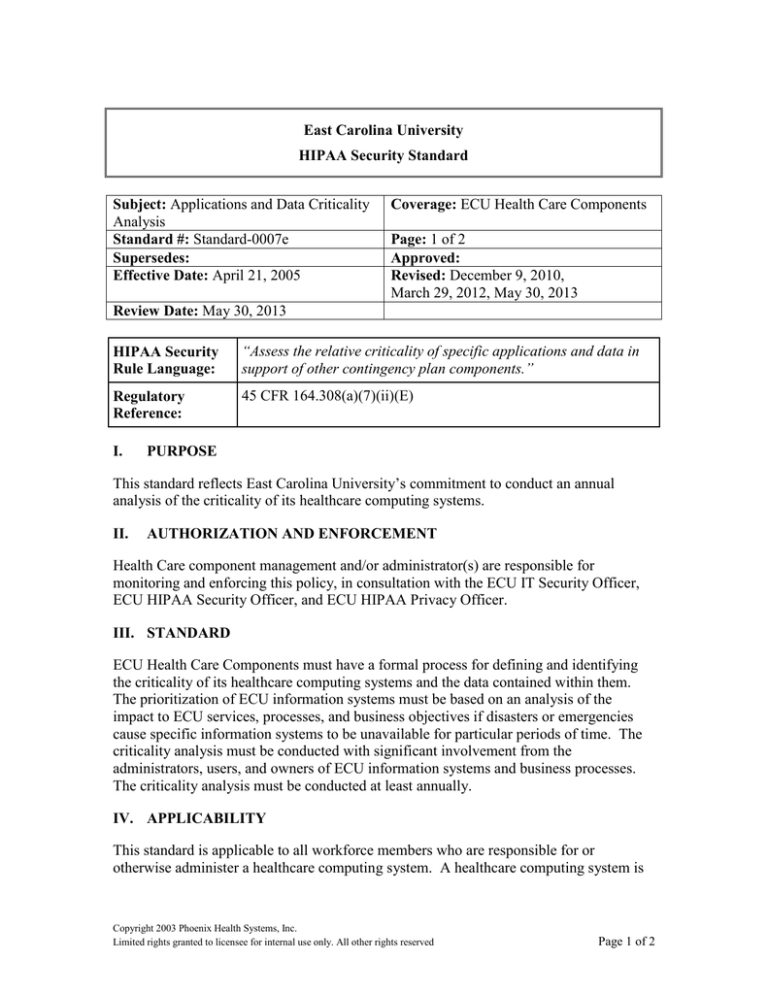
East Carolina University
HIPAA Security Standard
Subject: Applications and Data Criticality
Analysis
Standard #: Standard-0007e
Supersedes:
Effective Date: April 21, 2005
Coverage: ECU Health Care Components
Page: 1 of 2
Approved:
Revised: December 9, 2010,
March 29, 2012, May 30, 2013
Review Date: May 30, 2013
HIPAA Security
Rule Language:
“Assess the relative criticality of specific applications and data in
support of other contingency plan components.”
Regulatory
Reference:
45 CFR 164.308(a)(7)(ii)(E)
I.
PURPOSE
This standard reflects East Carolina University’s commitment to conduct an annual
analysis of the criticality of its healthcare computing systems.
II.
AUTHORIZATION AND ENFORCEMENT
Health Care component management and/or administrator(s) are responsible for
monitoring and enforcing this policy, in consultation with the ECU IT Security Officer,
ECU HIPAA Security Officer, and ECU HIPAA Privacy Officer.
III. STANDARD
ECU Health Care Components must have a formal process for defining and identifying
the criticality of its healthcare computing systems and the data contained within them.
The prioritization of ECU information systems must be based on an analysis of the
impact to ECU services, processes, and business objectives if disasters or emergencies
cause specific information systems to be unavailable for particular periods of time. The
criticality analysis must be conducted with significant involvement from the
administrators, users, and owners of ECU information systems and business processes.
The criticality analysis must be conducted at least annually.
IV. APPLICABILITY
This standard is applicable to all workforce members who are responsible for or
otherwise administer a healthcare computing system. A healthcare computing system is
Copyright 2003 Phoenix Health Systems, Inc.
Limited rights granted to licensee for internal use only. All other rights reserved
Page 1 of 2
HIPAA Security Standard #0007e: Applications and Data Criticality Analysis
defined as a device or group of devices that store EPHI which is shared across the
network and accessed by healthcare workers.
V.
PROCEDURE
1. ECU Health Care Components must have a formal, documented process for defining
and identifying the criticality of its information systems and the data contained within
them. At a minimum, the process must include:
Creating an inventory of interdependent systems and their dependencies.
Documenting the criticality of ECU’s information systems (e.g. impact on patient
care).
Identifying and documenting the impact to Health Care Component services, if
specific ECU information systems are unavailable for different periods of time
(e.g. 1 hour, 1 day).
Identifying the maximum time periods that healthcare computing systems can be
unavailable.
Prioritizing healthcare computing system components according to their
criticality to the Health Care Component’s ability to function at normal levels.
2. The criticality analysis must be conducted at least annually. The criticality analysis
report must be securely maintained.
VI.
COORDINATING INSTRUCTIONS
1. All section policies, standards and procedures will be reviewed annually. Every
section policy, standard and procedure revision/replacement will be maintained for a
minimum of six years from the date of its creation or when it was last in effect,
whichever is later. Other East Carolina University, University of North Carolina
system, or state of North Carolina requirements may stipulate a longer retention
period.
Copyright 2003 Phoenix Health Systems, Inc.
Limited rights granted to licensee for internal use only. All other rights reserved
Page 2 of 2



